Statements, supported by evidence, of Wm. T. G. Morton, M.D. on his claim to the discovery of the anaesthetic properties of ether; submitted to the honorable the Selected Committee appointed by the Senate of the United States, 32d Congress, 2d session, January 21, 1853. Washington, D.C.: [U.S. Senate?], 1853.
 There has been considerable controversy over who first discovered anesthesia, but it is certain that William T. G. Morton first publicly displayed its usefulness in surgery. The introduction of ether as an anesthetic was a great aid to the advancement of surgery and relief to patients all over the world. The man largely responsible for its introduction is Morton, who originally began searching for an anesthetic while practicing dentistry in Connecticut. Dentists in that day were particularly interested in finding a way to reduce pain, because unlike other medical conditions requiring painful surgery, tooth ailments are seldom life-threatening, and so patients were not willing to endure surgery for them (Duffy 112). Since Morton’s specialty was artificial teeth, which required extraction, he experimented with a variety of possible pain reducers — stimulants, intoxication, opium, and mesmerism — but none seemed to work well enough. Eventually, he enrolled as a medical student under Dr. Charles T. Jackson, in an attempt to find a solution. Jackson showed his students that unconsciousness results from the inhalation of pure sulfuric ether, and recommended it to Morton for use in dentistry. After painlessly extracting teeth from patients who were under the influence of ether, Morton began to see the drug’s potential in more complicated and invasive surgeries. In 1846, he persuaded surgeon Dr. John Collins Warren to allow the anesthetization of a patient undergoing the removal of a neck tumor (Kelly & Burrage 878-879). In front of a Harvard Medical School class, the operation was performed with the patient feeling no pain. The assisting surgeon, Dr. Henry Bigelow, reported his observations in a medical journal. Support from men such as Bigelow and Warren who had such great reputations allowed the use of ether to spread all over the world (Garrison 506).
There has been considerable controversy over who first discovered anesthesia, but it is certain that William T. G. Morton first publicly displayed its usefulness in surgery. The introduction of ether as an anesthetic was a great aid to the advancement of surgery and relief to patients all over the world. The man largely responsible for its introduction is Morton, who originally began searching for an anesthetic while practicing dentistry in Connecticut. Dentists in that day were particularly interested in finding a way to reduce pain, because unlike other medical conditions requiring painful surgery, tooth ailments are seldom life-threatening, and so patients were not willing to endure surgery for them (Duffy 112). Since Morton’s specialty was artificial teeth, which required extraction, he experimented with a variety of possible pain reducers — stimulants, intoxication, opium, and mesmerism — but none seemed to work well enough. Eventually, he enrolled as a medical student under Dr. Charles T. Jackson, in an attempt to find a solution. Jackson showed his students that unconsciousness results from the inhalation of pure sulfuric ether, and recommended it to Morton for use in dentistry. After painlessly extracting teeth from patients who were under the influence of ether, Morton began to see the drug’s potential in more complicated and invasive surgeries. In 1846, he persuaded surgeon Dr. John Collins Warren to allow the anesthetization of a patient undergoing the removal of a neck tumor (Kelly & Burrage 878-879). In front of a Harvard Medical School class, the operation was performed with the patient feeling no pain. The assisting surgeon, Dr. Henry Bigelow, reported his observations in a medical journal. Support from men such as Bigelow and Warren who had such great reputations allowed the use of ether to spread all over the world (Garrison 506).
Shortly thereafter, competitors for priority of the discovery arose. Crawford Long of Georgia had been using ether in surgery since 1842, but he did not publish his findings or make them known to the medical community until several years after Morton. Horace Wells, Morton’s former dentistry partner, used inhalation of nitrous oxide as an anesthetic, but when he had the opportunity to show its effects publicly, it failed him. And of course, Charles T. Jackson had introduced ether to Morton, but had not realized its full potential. He showed no appreciation for the drug’s surgical benefits until the controversy had already begun (Kelly & Burrage 636). Controversy arose in response to the claims, and in 1853, a special congressional committee investigated the issue. The Reynolds-Finley Library has a copy of Statements, supported by evidence, of Wm. T. G. Morton, M.D. on his claim to the discovery of the anaesthetic properties of ether, which presents strong evidence in support of Morton’s propriety (Heirs of Hippocrates 1000).
Clendening, Source Book of Med. Hist., p. 355; Duffy, From Humors to Med. Sci., p. 112; Garrison, Hist. of Med.,4th Edition, p. 506; Heirs of Hippocrates, 1000; Kelly & Burrage, Dict. Amer. Med. Bio., pp. 636, 878-879; Reynolds Historical Library, Rare books and coll…, 1290.
Image: William T. G. Morton, Print Collection, Reynolds-Finley Historical Library.
